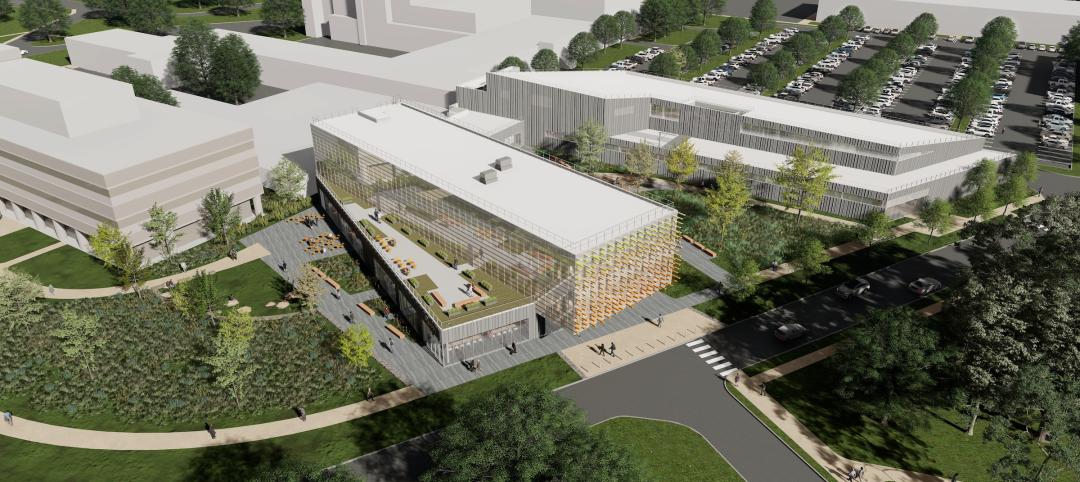America’s crumbling roads, decrepit bridges, aged water systems. Our deficient dams, underserved levees, and woeful wastewater treatment plants. For nearly three decades, the American public has heard ad nauseam about the dreadful condition of the nation’s infrastructure—from airports to railways to hazardous waste facilities.
Since 1988, the American Society of Civil Engineers, through its Infrastructure Report Card, has shone a spotlight on the alarming shortfall in funding and resources to operate, maintain, and modernize the country’s infrastructure network. ASCE’s latest report card, released in March, scores the nation’s overall infrastructure at a D+ (it’s never scored higher than C). The price tag to modernize the country’s infrastructure systems: a whopping $4.59 trillion over 10 years, more than triple the cost from the 2001 report.
Of the 16 infrastructure sectors that ASCE evaluates quadrennially, only one—K-12 schools—is buildings-focused. The trade group scored the nation’s 100,000 public school buildings at a collective D+, citing an annual investment shortfall of $38 billion to maintain and upgrade facilities and a backlog of necessary improvements (53% of schools require upgrades to reach “good” condition).
Left out of this ongoing national debate over infrastructure—and the trillions of dollars of public funding that is expected over the next few decades—are the nation’s other public buildings: the libraries, community centers, courthouses, community college buildings, affordable housing developments, and justice facilities.
These, too, are critical to the safety, security, and vibrancy of cities and communities. And as is the case with the nation’s public schools and major infrastructure sectors, these so-called “social infrastructure” buildings are being neglected, with years of deferred maintenance, patchwork repairs, dwindling CapEx and OpEx budgets, and even the weakening and repeal of building codes—especially those related to resiliency and sustainability.
Thrusting the nation’s social infrastructure into the spotlight has been a recent crusade of the leadership at the American Institute of Architects. AIA kicked off this initiative in November 2016 with a national poll of 2,108 U.S. adults to assess the importance of public buildings to their communities. The findings: more than 80% see public buildings as part of the nation’s infrastructure, and 94% agree that well-supported buildings are important to their communities (whether they’re willing to open their wallets to help fund such
efforts is another question).
AIA has had its share of controversy during the past 12 months, most notably the post-election statements that riled some of its members. But AIA leadership deserves a pat on the back for its efforts with this campaign. Let’s just hope their proclamation resonates with the nation’s policymakers.
Related Stories
Women in Design+Construction | May 28, 2024
Commerce Department launches Million Women in Construction Community Pledge
The U.S. Department of Commerce launched its Million Women in Construction Community Pledge this month to boost the ranks of women in construction companies. Federal investments are creating a construction boom that is increasing job opportunities for construction and trade workers.
Laboratories | May 24, 2024
The Department of Energy breaks ground on the Princeton Plasma Innovation Center
In Princeton, N.J., the U.S. Department of Energy’s Princeton Plasma Physics Laboratory (PPPL) has broken ground on the Princeton Plasma Innovation Center (PPIC), a state-of-the-art office and laboratory building. Designed and constructed by SmithGroup, the $109.7 million facility will provide space for research supporting PPPL’s expanded mission into microelectronics, quantum sensors and devices, and sustainability sciences.
MFPRO+ News | May 24, 2024
Austin, Texas, outlaws windowless bedrooms
Austin, Texas will no longer allow developers to build windowless bedrooms. For at least two decades, the city had permitted developers to build thousands of windowless bedrooms.
Resiliency | May 24, 2024
As temperatures underground rise, so do risks to commercial buildings
Heat created by underground structures is increasing the risk of damage to buildings, recent studies have found. Basements, train tunnels, sewers, and other underground systems are making the ground around them warmer, which causes soil, sand, clay and silt to shift, settle, contract, and expand.
Sports and Recreational Facilities | May 23, 2024
The Cincinnati Open will undergo a campus-wide renovation ahead of the expanded 2025 tournament
One of the longest-running tennis tournaments in the country, the Cincinnati Open will add a 2,000-seat stadium, new courts and player center, and more greenspace to create a park-like atmosphere.
Mass Timber | May 22, 2024
3 mass timber architecture innovations
As mass timber construction evolves from the first decade of projects, we're finding an increasing variety of mass timber solutions. Here are three primary examples.
MFPRO+ News | May 21, 2024
Massachusetts governor launches advocacy group to push for more housing
Massachusetts’ Gov. Maura Healey and Lt. Gov. Kim Driscoll have taken the unusual step of setting up a nonprofit to advocate for pro-housing efforts at the local level. One Commonwealth Inc., will work to provide political and financial support for local housing initiatives, a key pillar of the governor’s agenda.
Building Tech | May 21, 2024
In a world first, load-bearing concrete walls built with a 3D printer
A Germany-based construction engineering company says it has constructed the world’s first load-bearing concrete walls built with a 3D printer. Züblin built a new warehouse from a single 3D print for Strabag Baumaschinentechnik International in Stuttgart, Germany using a Putzmeister 3D printer.
MFPRO+ News | May 21, 2024
Baker Barrios Architects announces new leadership roles for multifamily, healthcare design
Baker Barrios Architects announced two new additions to its leadership: Chris Powers, RA, AIA, NCARB, EDAC, as Associate Principal and Director (Healthcare); and Mark Kluemper, AIA, NCARB, as Associate Principal and Technical Director (Multifamily).
MFPRO+ News | May 20, 2024
Florida condo market roiled by structural safety standards law
A Florida law enacted after the Surfside condo tower collapse is causing turmoil in the condominium market. The law, which requires buildings to meet certain structural safety standards, is forcing condo associations to assess hefty fees to make repairs on older properties. In some cases, the cost per unit runs into six figures.

















